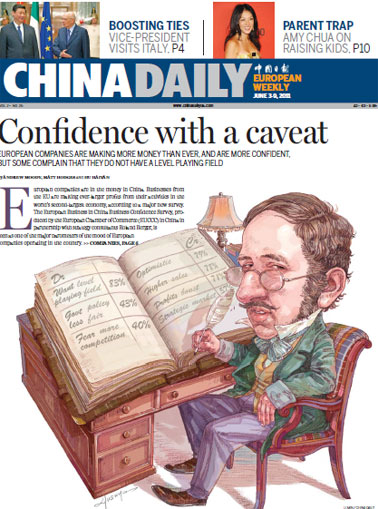Economy
Debt deal urged for Greece
Updated: 2011-06-03 08:12
By Ingrid Melander and Andrei Khalip (China Daily)

A pedestrian surveys discounted products in the shopping district of central Athens, Greece. Moody's Investors Service lowered the country's credit rating to the same level as Argentina's in July 2001, five months before the South American country announced it would default on its debt. Kostas Tsironis / Bloomberg |
The country has seen credit rating slashed deep into 'junk' territory
ATHENS, Greece / LISBON, Portugal - A European Central Bank (ECB) policymaker said a voluntary deal for investors to keep renewing their Greek debt holdings might be acceptable, raising hopes on Wednesday for an aid agreement to prevent a default by Greece.
But Moody's Investors Service slashed Greece's credit rating by three notches to deep into junk territory, citing a growing risk that Athens would fail to stabilize its debt position without a restructuring that could mean losses for private investors.
A lackluster debt auction in Portugal and stalled Spanish wage talks highlighted market concerns that the Greek crisis could broaden and deepen further.
ECB Executive Board member Juergen Stark was quoted as saying that the central bank might accept a rollover of Greek debt by private investors, in which they would voluntarily agree to maintain their exposure to Greece through purchases of new bonds when their existing bond holdings matured.
"If this possibility is not perceived as a default or a partial sovereign default, then it could be a way of involving the private sector in financing Greece," Stark said in an interview with the Italian financial daily, Il Sole 24 Ore.
ECB officials have for months been opposing any steps involving private creditors that might be seen as a default. So the ECB's willingness to consider a rollover suggested Greece and creditors were making progress towards a new financing deal.
"Everyone seems to be converging slowly but surely toward a consensus which is likely to involve a mix of additional aid, more austerity and some private sector involvement," said Gilles Moec, an economist at Deutsche Bank.
Sources close to talks between Athens and inspectors from the European Commission, the ECB and the International Monetary Fund said they expected the latest review of fiscal reforms in Greece to be completed by Friday.
One Greek official involved in the discussions expressed optimism that this "troika" of institutions would release a 12 billion euro ($17 billion) loan tranche that Greece needs to cover its short-term funding needs.
"There will be a way for the disbursement of the fifth installment to be approved," the official told Reuters, requesting anonymity.
"The negotiations with the troika will be concluded at the latest by Friday."
Moody's, however, said there was a high chance of further downgrades as it cut Greece to Caa1, a full seven notches into junk territory. This took the Moody's rating three notches below Fitch's B-plus and two notches below Standard & Poor's B rating.
Greece is now rated by Moody's at the same level as Argentina in July 2001, about five months before that country announced it would default on its debt.
"At Caa1, historically, we've seen around 50 percent of sovereigns, corporates and financial institutions defaulting," Moody's analyst Sarah Carlson told Reuters.
Meanwhile, Portugal's short-term borrowing costs spiked higher in a bill auction on Wednesday and data showed manufacturing weakness across the periphery of the 17-nation eurozone, as the debt crisis that erupted in late 2009 continued to take its toll.
Portugal, which agreed to a 78 billion euro European Union/International Monetary Fund bailout last month and received its first tranche on Wednesday, sold 850 million euros in four-month T-bills at an average yield of 4.967 percent, more than 0.3 percentage point above what it paid for three-month paper less than a month ago.
Elisabeth Afseth, a fixed-income analyst at Evolution Securities, said the sale showed there was "still a lot of nervousness in the market and fears that there will be contagion from the Greece situation to Ireland and Portugal".
In Spain, the Economy Minister Elena Salgado conceded that talks between unions and employers on reforming collective wage bargaining were stalling.
A reform of rules governing wage agreements would be one way to reassure markets that the country is serious about boosting productivity levels which are among the lowest in the eurozone.
Reuters
E-paper

Harbin-ger of change
Old industrial center looks to innovation to move up the value chain
Chemical attraction
The reel Mao
Improving app-iness
Specials

Vice-President visits Italy
The visit is expected to lend new impetus to Sino-Italian relations.

Birthday a new 'starting point'
China's national English language newspaper aims for a top-notch international all-media group.

Sky is the limit
Chinese tycoon conjures up green dreams in Europe with solar panels
